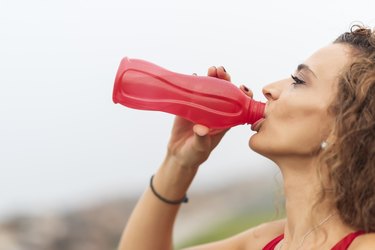
It is normal to feel thirsty at various points throughout the day, especially after eating salty foods and after exercise. But, if you are drinking plenty of water but still experiencing dehydration symptoms, something could be wrong.
See your doctor for a work up if you feel thirsty despite regularly drinking water. Some diseases that cause dehydration can be serious.
Video of the Day
Video of the Day
Examine Your Diet
Eating a salty or spicy meal may cause a strong, but temporary, urge to drink, according to Harvard Health Publishing. Your kidneys regulate body fluid volume. Eating salty food increases sodium concentrations in your blood relative to water.
Water found in and around your cells moves into your bloodstream to restore the sodium/water balance, according to a December 2016 article published by Current Biology. Your kidneys remove the excess sodium and water by excreting them in urine.
This process triggers a chemical reaction to prevent dehydration by inducing thirst to replenish lost water. Because they slightly increase your body temperature, metabolism of spicy foods requires extra water, which is why spicy foods make you thirsty.
Identify Dehydration Symptoms
You may become dehydrated due to exercise, a fever, having diarrhea, drinking alcohol or taking certain medications. Symptoms of dehydration can include decreased urination, a dry mouth, fatigue, headache, confusion and dizziness, according to the Mayo Clinic.
As dehydration progresses, you may have very dry mucous membranes, no urination at all, a lack of perspiration and rapid heartbeat.
Severe cases of dehydration can cause shock, seizures, kidney failure, unconsciousness and death. Usually, drinking enough fluids is enough to prevent dehydration, but if you are ill or exercising strenuously in hot weather, you can still experience dehydration.
Constantly Dehydrated: Diagnosis Diabetes
If you feel constantly dehydrated, a diagnosis of diabetes might be in order. One of the first symptoms of diabetes is often excessive thirst along with producing large amounts of urine.
Other symptoms of diabetes include excessive hunger, fatigue, weight loss and vision changes. Sometimes these symptoms may come on very suddenly and with no warning, according to the World Health Organization.
Left unchecked, diabetes can cause damage to the heart, eyes, kidneys and other body organs. Depending on the type of diabetes, your doctor might prescribe injected or oral medications along with lifestyle changes, such as quitting smoking and losing weight.
Beware of Other Medical Conditions
There are several diseases that cause dehydration or excessive thirst. Heart failure prevents maintenance of adequate blood flow. The reduction in blood volume induces thirst. Kidney failure causes extreme thirst, because the kidneys can no longer maintain body fluid balance, according to the U.S. National Library of Medicine.
Liver problems may cause blood vessels in the esophagus to become enlarged and bleed. The decrease in blood volume caused by bleeding, triggers extreme thirst due to body fluid imbalance.
Polydipsia, a mental condition that causes extreme thirst, has many causes, including stress and anxiety, as discussed in a November 2017 article published by Swiss Medical Weekly.
If you are thirsty for no apparent reason, speak with your doctor to rule out a medical or emotional problem.
- World Health Organization: "Diabetes"
- Current Biology: "Thirst"
- Mayo Clinic: "Dehydration"
- Swiss Medical Weekly: "Primary Polydipsia in the Medical and Psychiatric Patient: Characteristics, Complications and Therapy"
- U.S. National Library of Medicine: "Thirst — Excessive"
- Harvard Health Publishing: "Dry Mouth and Excessive Thirst"